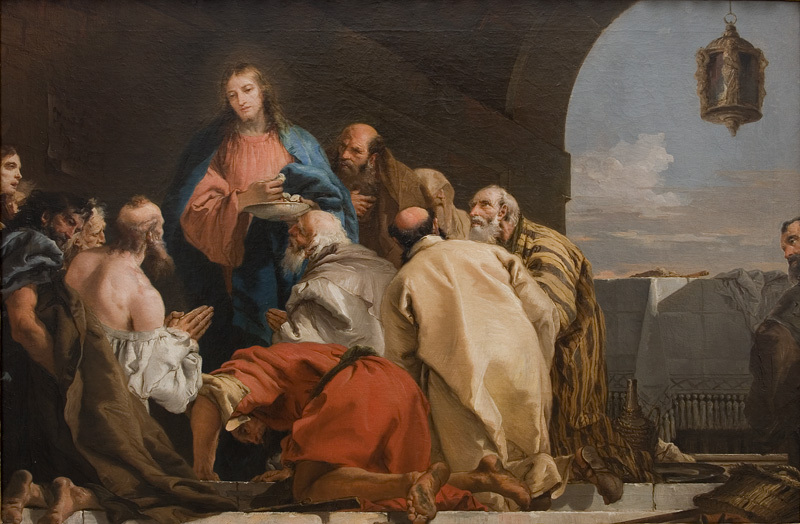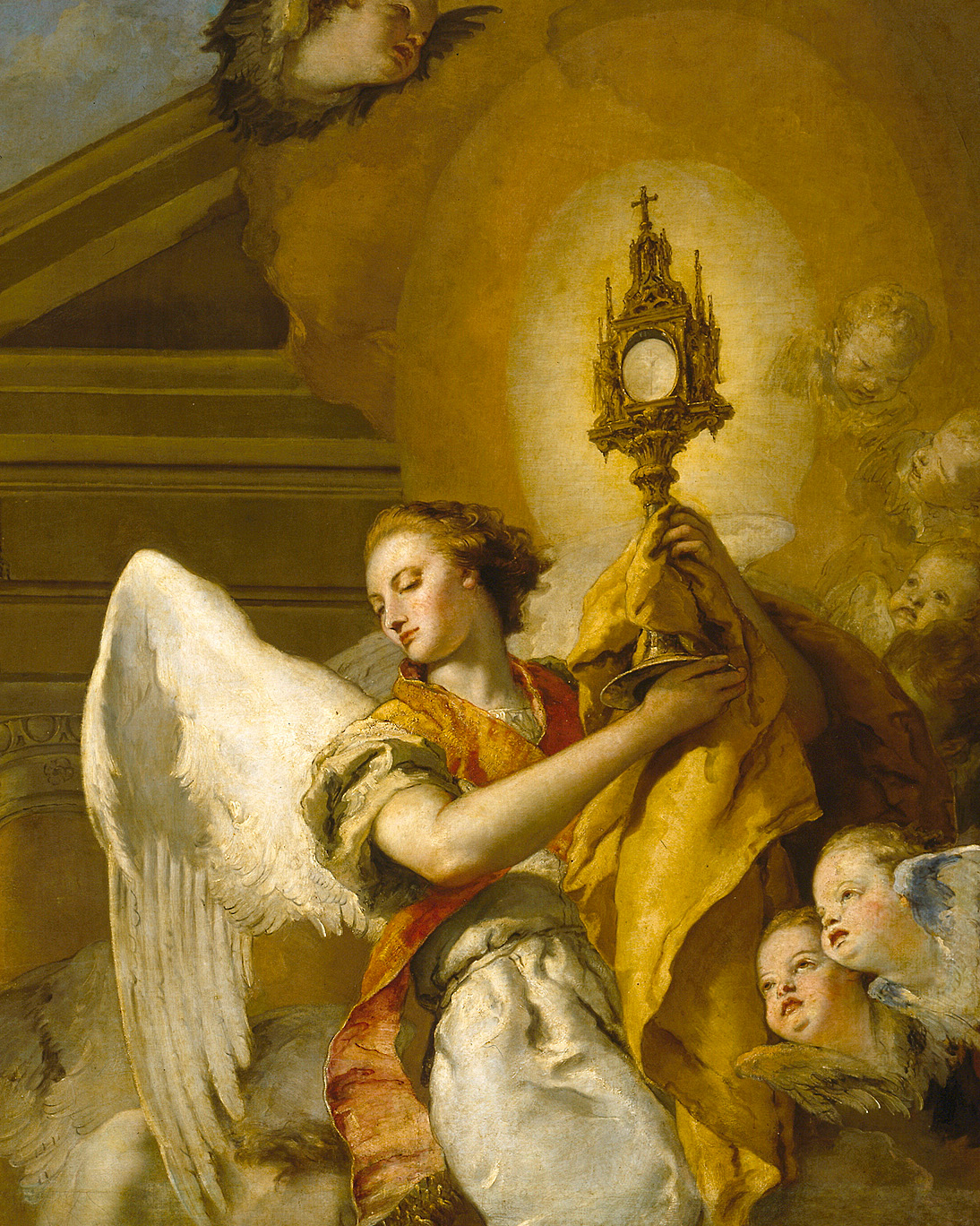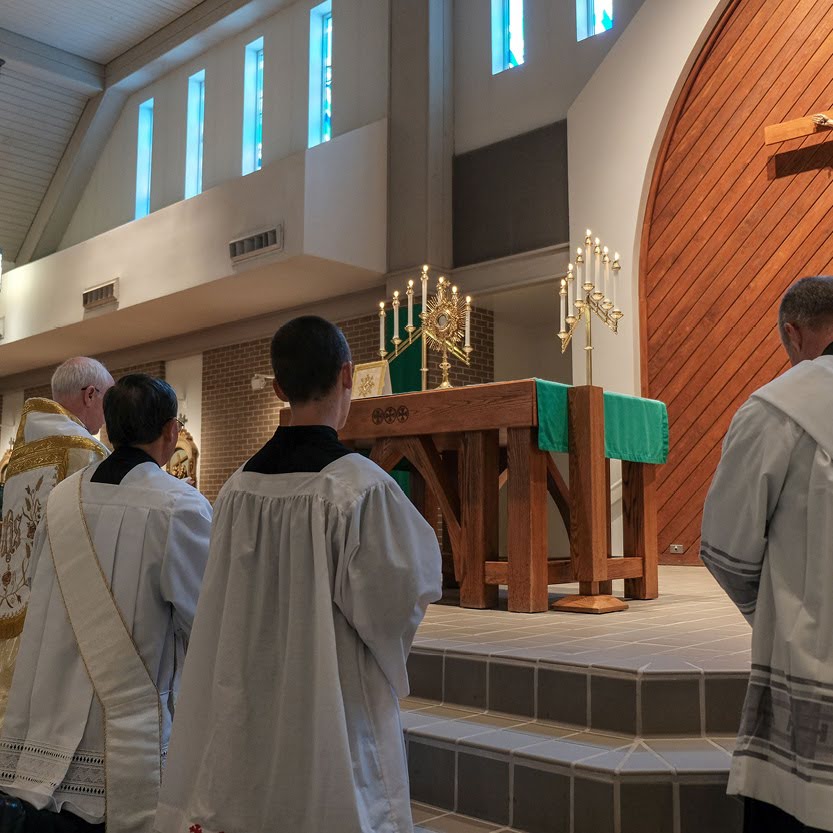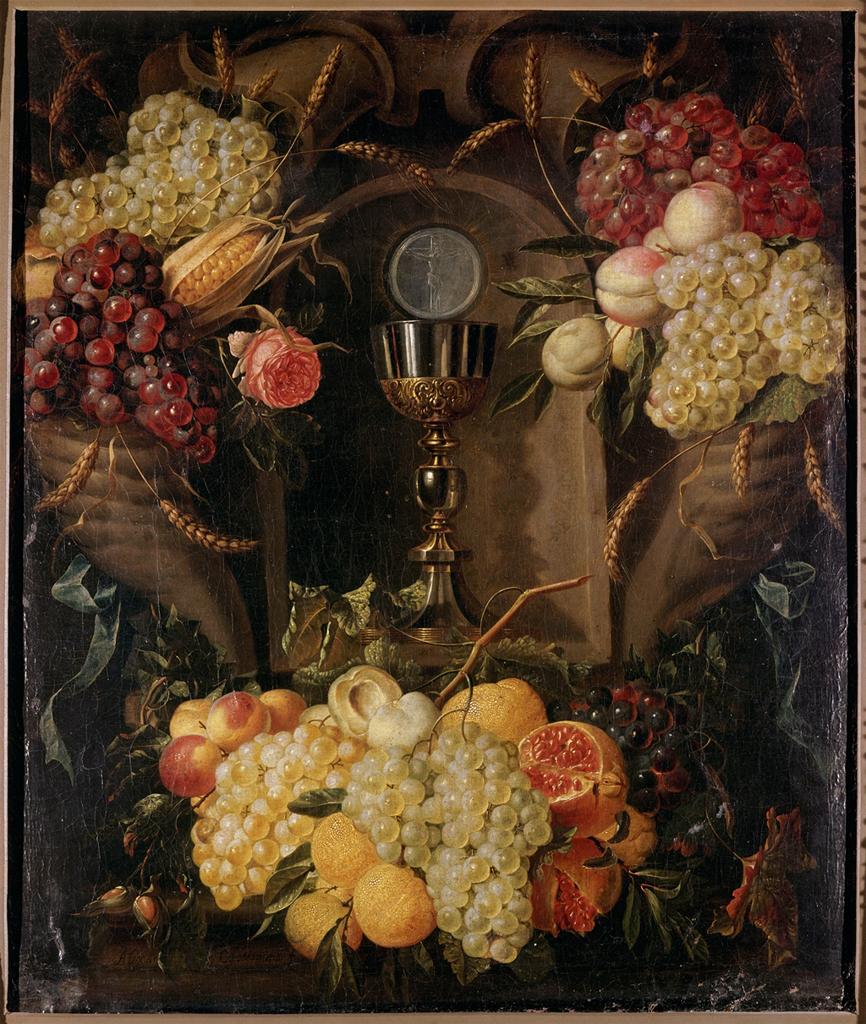The Holy Eucharist
Let us now turn to the greatest subject in all the world, in all the cosmos; let us turn to the subject that causes every angel to bend his knee and bow his head, while causing every demon to vomit in disgust, to snarl in fury, to shriek in agony: that is none other the Blessed Eucharist.
Belief in the True Presence
Consider, dear parent, what if news pinged and dinged through every social media outlet and news channel that Jesus Christ had appeared in your parish? Flocks of people—believers and non-believers alike—would flood the sanctuary, crowd the streets, and fling themselves prostrate before Our Lord’s flesh and blood.
Would you load up your child immediately into the car? Would you skip soccer practice? Would you postpone your chores? Would you and your spouse look at each other with wonder and awe and with a bit of fear and trepidation? Would your heart pound? Would your mind race with memories of shame and remorse?
And how would you prepare your child for this miracle? What words would you use to inspire him, to focus his mind? Might you worry that the end of the world was upon you, your spouse, and your little ones? And upon standing before Jesus Christ in the flesh, how would you conduct yourself? Would you be overly worried about the state of your hair or your newest outfit, or perhaps a bit more concerned with the state of your soul?
Would you be directing and even begging your children of all ages to gaze upon their God with the most profound reverence? And seeing their inability to do so, would you regret missing the countless opportunities to teach them how?
And how ashamed might you feel if your teenagers checked their smartphone before He who died on the cross for them? And how ashamed might you be if Jesus asked you and your spouse, “Why do you act so piously now?” You reply, “You are my Lord, my Savior.” He then asks you and your spouse, “But why are you acting differently than ever before?”
You answer, “Because I have never seen You before.” He slowly shakes His head and says the very words He said two thousand years ago, “Blessed are they that have not seen, and have believed” (Jn 20:29).
Perhaps this image helps us see what little faith we possess. But not all of us. The elect, those few who enter through the narrow way (see Mt 7:14), do not need eyes to see the flesh and blood of Jesus Christ. And neither do your children!
A great French king and saint of the Church, Louis IX, did not need his eyes to believe. Father Michael Mueller, one of the greatest lovers of the Eucharist, tells the following story in his masterpiece The Blessed Eucharist: Our Greatest Treasure:[1]
“One day, when St. Louis, King of France, was invited to go to a church in which Our Lord appeared in the Holy Eucharist under the form of an infant, he replied: ‘I will not go to see my Lord in the Holy Eucharist because I believe that He is present there as firmly as if I had seen Him. Let those go and see Him who do not believe.’”[2]
And so, good parent, I ask again: what would you do if Our Lord appeared in flesh and blood in your parish? A saint would answer, “Nothing different than I do every Sunday.” But are we not all sinners? While we should marvel at the miraculous, they are only performed for the sake of emboldening our faith.
Believe without seeking miracles! Believe with the eyes of faith, not because science fails to explain away Eucharistic miracles. Believe, even though the appearance of bread and wine stares back at you.
Let us consider why Our Eucharistic Lord hides Himself from you and your family. If Jesus wants your little first communicant in her pretty dress and veil to believe in Him, why does He not show Himself? If you ask this, you have asked an excellent question.
In The Blessed Eucharist, Father Mueller explains two reasons why Our Lord hides Himself in the Eucharist:
But you perhaps ask: “Why does Our Lord hide Himself under the outward appearance of bread and wine? Why does He not manifest Himself under the sensible qualities of His Body, with His wounded hands, His merciful countenance, His radiant majesty?”
Now, Our Lord does so chiefly for two reasons: The first is that we may not lose the merit of faith. Were we to see Jesus Christ as He is seen by the blessed in Heaven, we could no longer make an act of faith in His Real Presence, for “faith is the belief in things we do not see” (St. Paul).
Now Our Lord wishes to bestow on us after this life a great reward for our faith, as He Himself has said: “Blessed are they that do not see and yet believe.”
Many of the Saints, in order not to lose the merit of their faith, have gone so far as to beg Our Lord not to favor them those consoling manifestations of Himself in the Blessed Sacrament which He has sometimes granted to His chosen servants. . . .
The second reason why Our Lord hides Himself is that He might inspire us with confidence. If He were to show Himself in all His glory, as He appears to the Angels and Saints in Heaven, who would dare to approach Him? Surely no one.
But Jesus most earnestly desires to unite Himself intimately to our souls, and therefore He conceals Himself under the outward form of bread, that we may not be afraid of Him. “Our great King,” says St. Teresa, “veils Himself that we may receive Him with greater confidence.”
Help your child understand these two reasons: First, because your little one must see the Eucharist with the eyes of faith, for our eternal reward is largely based upon this very faith. Imagine the standard to which your child would be held if he had the beatific vision on earth!
Your child would have the culpability of an angel. In this manner, we ought to thank God for withholding Himself from our eyes during this earthly life. And secondly, God hides Himself from your little one so that your child can approach the altar rail with confidence. Your son or daughter could not handle seeing Our Lord in His triumphant glory.
But Jesus Christ appears to your child as a little wafer and a little wine—something so small and innocent. How precious that your small and innocent first communicant, at the mere age of seven, can receive the God of the universe and His grace into his little body and soul.
Reverence for the Blessed Eucharist
As the primary educators, you must teach your child Eucharistic piety above all else. Show your child your lively example and vibrant faith in the Eucharist. Show him that your faith is so strong that your body changes in His presence. The mighty father who—to a little one—is the strongest man in the world meekly genuflects before the tabernacle and prostrates before the exposed Presence in the monstrance.
Mighty father of the little ones: show your weakness, your frailty, your total and complete subjection to the King of the Universe. Let your little one marvel at your physical demeanor, for nowhere else in life will the little one see Daddy so meek, with eyes cast down and head bowed and knees bent and hands folded and heart overwhelmed with humility.
Show your son, who will one day be a man like you, that you know nothing, you possess nothing, and you are nothing before the Blessed Eucharist.
And Mommy, let all your candor and competence, all your order and structure, all your delicacy and decorum, all your feminine savviness and strength lay before the Presence completely and utterly surrendered, offering every ounce of body and soul, every ounce of your purity, every ounce of your beauty; lay it all out for your son to see the true beauty of a woman completely subordinate to the King of kings; lay it all out for your daughter to see what a real woman does at her most productive and fruitful time.
Your children will learn more from your physical demeanor before the True Presence than they will learn in all the manners you instill, in all the homework you help them with, and even more than from all the catechesis you teach them.
Hear me, dear parent: your body is the truest catechism for your little ones before the Blessed Eucharist.
Visiting the Blessed Sacrament
Have you considered the indescribable fortune of having the Blessed Eucharist down the street from your son or daughter? How far would you take your little ones to receive and be received by Our Lord? And might you, after reading the little passage below, forever explain the story of the Magi differently to your little ones?
“Where is the newborn King of the Jews?” inquired the three Magi of Herod, king of Jerusalem. “Where is He?” they repeat in their great desire to find Him. . . . Beloved Christian, you have heard and read this incident among the many wonderful events in the life of our God and Saviour.
On hearing or reading the account, you have perhaps even earnestly desired to have lived at the times of the Apostles in order that you might have had the happiness of seeing your Lord and Saviour. But you ought to know that you are happier now than if you had lived at that time of the Apostles, for you might have been obliged to travel very far and make many inquiries to find out the place of His abode.
But now there is no need of traveling far or of making many inquiries to find Him. He is, as we know by faith, in our churches, not far from our Homes. The Magi could find Him in one place only; we can find Him in every part of the world, wherever the Blessed Sacrament is kept.[3]
How many quick stops you make at the grocery store! How easily you pick up a coffee in the drive-through! How much enjoyment you get out of grabbing a quick lunch with your friend! But the best you get is a filled belly, a caffeine fix, or a few laughs.
All the while, Our Lord waits alone in the tabernacle, awaiting you. He offers heavenly nourishment that will never leave one hungry. He offers an inexhaustible source of vigor and zeal and passion, not mere spurts of energy that burn out with the setting sun.
He offers an all-loving ear to hear your worries, an omnipotent shoulder to cry upon, and an everlasting friendship that will never let you down. And He has made Himself available in every Catholic church on earth. He awaits you. Like His apostles in the garden, He beseeches us, “Could you not spend time with me?”
Or like Adam and Eve after sinning, “Where are you?” Perhaps more importantly, He asks you, “Where are your little ones?” Did He not say that you must let the little children come unto Him (see Mk 10:14; Mt 19:14)?
How steadfast you are, dear parent, in taking your child to the doctor, to the dentist, to the ophthalmologist, anyone and everyone needed to care for that little body. But please consider that the little body will turn to dust, the teeth will decay, and the eyes will lose their sight. Yet that little soul—made in the image and likeness of Almighty God—will forever remain, long past when the earth can sustain life, long past when the sun burns out.
Tonight, go outside with your little one and look up at the night sky; explain to your child how ancient the stars are and how it has taken millions of years for the light to reach our planet; explain how those billions and billions of stars will continue to dazzle the universe for billions and billions of years, long after our planet loses all its beautiful color of green life and blue water.
And then look at your child and say, “But you, dear little one, will outlive every star in the sky. Your soul will burn bright after every one of those specks in the heavens have vanished into nothingness. You are immortal. You will see Mars turn to dust. You will see the greatest stars become tiny pebbles floating in space.
You will outlive every material object in God’s vast universe. Why? Because God loves you more than every comet, more than every planet, and every black hole, and every star. God made you in His image and likeness so that you can be with Him forever and ever and ever.”
Have you, loving parent, considered that your child’s soul will outlive everything in the material universe? Consider this next time you tell her to brush her decaying teeth but fail to help her examine her immortal conscience. Consider this next time you scurry her around town in the minivan to this or that doctor but fail to visit the Divine Physician awaiting in the Blessed Eucharist in the golden tabernacle just miles away from where you are sitting at this very moment.
Take your little one—for five minutes! What? You have no time? You have too much to do? Too many errands to run? Our Eucharistic Lord knows that children can’t sit still; He made them that way. He knows that children don’t understand the sacramental mysteries; He will reveal the truths in His own time.
He knows that you, father and mother, are exhausted and just want to get “stuff” done, but He calls you, as a parent, to so much more than efficiency. Your child does not need to be an honor student or a great athlete or musician. But your child needs to learn that the Blessed Eucharist is the answer to all of life’s problems.
In The Blessed Eucharist, Father Mueller challenges the reader to consider life’s problems in light of the blessings available to us. As a parent, all of your attention and energy should go in to helping your child, regardless of age, understand the following:
“Why should you take life so hard and complain of your crosses and trials and be so impatient in every difficulty? Why should you envy the rich of this world, the great and the honored? Why should you vex yourself at injuries and groan in adversity? Why should you faint at the thought of self-denial and conflict? Are you not a Catholic? Have you not the sweet services of the Church to soothe you and her Sacraments to nourish you, her benedictions to strengthen you and her absolution to cleanse you? Have you not Mary for your Mother and the Angels and Saints for your patrons and protectors, and above all, in the Blessed Sacrament, Jesus for your Father?”[4]
Do you teach your child that the Blessed Sacrament is the fulfillment of your child’s desires and the solution to his struggles? Do you realize it for yourself? How foolish we can be, seeking worldly answers to everything.
You, my dear parent, are Catholic! You are Catholic! This means that you have, as Father Mueller explained so elegantly, unimaginable access to grace through the Church, the sacraments, and most especially, the Blessed Sacrament.
Take your children to the Divine Physician. Take them now. If this little book has stirred up the slightest feeling of zeal, take them now, even if you must sit outside in the parking lot. Let your children know that God is truly present in the Eucharist just on the other side of the wall.
And then pray, dad and mom, that for the rest of your children’s lives, they will turn to the Eucharist in times of joy and in times of sorrow. If this happens with your influence, you, dear parent, will have done your job. And Jesus Christ, the Second Person of the Blessed Trinity, will say to you, “Well done, good and faithful servant.” Just imagine . . .
Source: Parenting for Eternity by Conor Gallagher, Published by TAN Books (cf. Chapter 2: The Virtue of Piety).

[1] In the limited opinion and experience of the author, this is the greatest work on the Holy Eucharist ever written. TAN Books is so proud to publish a masterpiece that sings out to the soul the glories of our Greatest Treasure, that pleads with us to treat the Eucharist just as we would God Himself, for it truly is God! Read this book and your life will never be the same. Read this book and you will see that raising your kids with a love of the Eucharist is your greatest calling as a parent.
[2] Michael Mueller, The Blessed Eucharist: Our Greatest Treasure (Charlotte, NC: TAN Books, 2010), p. 11.
[3] Michael Mueller, The Blessed Eucharist, p. 48.
[4] Michael Mueller, The Blessed Eucharist, p. 91, emphasis added.








